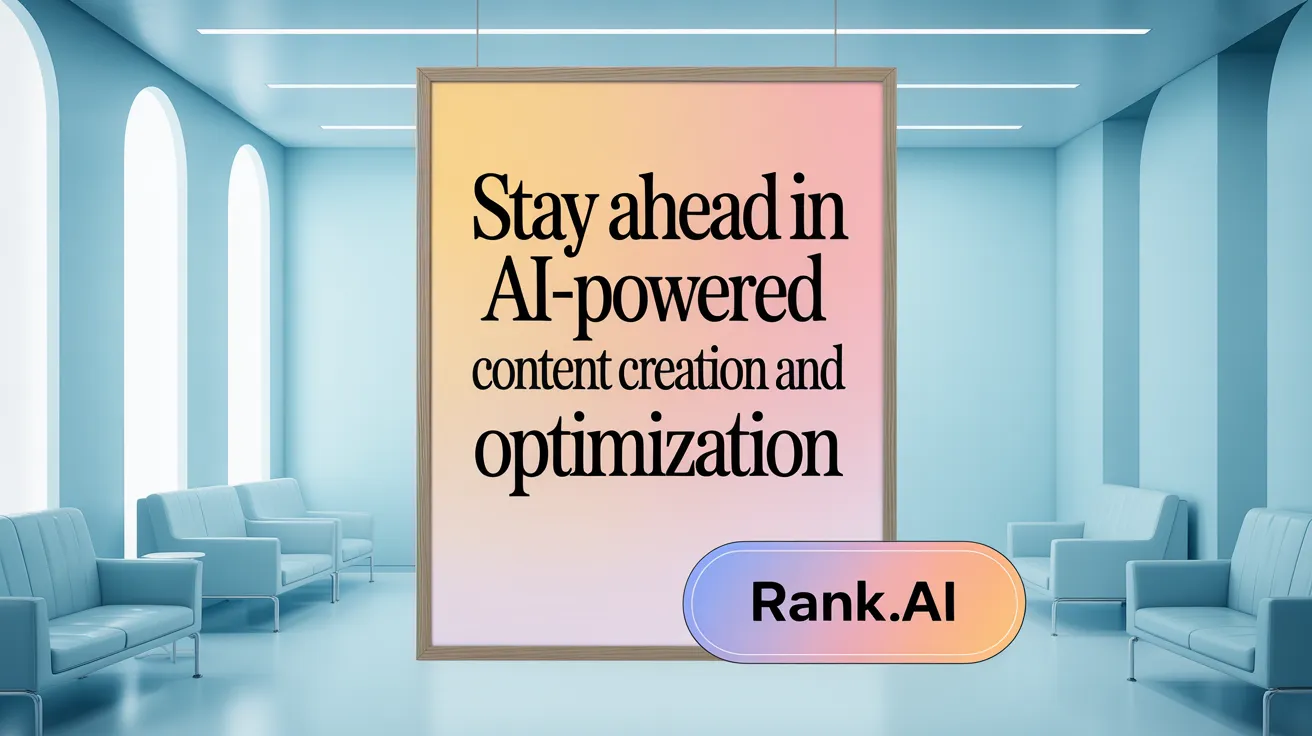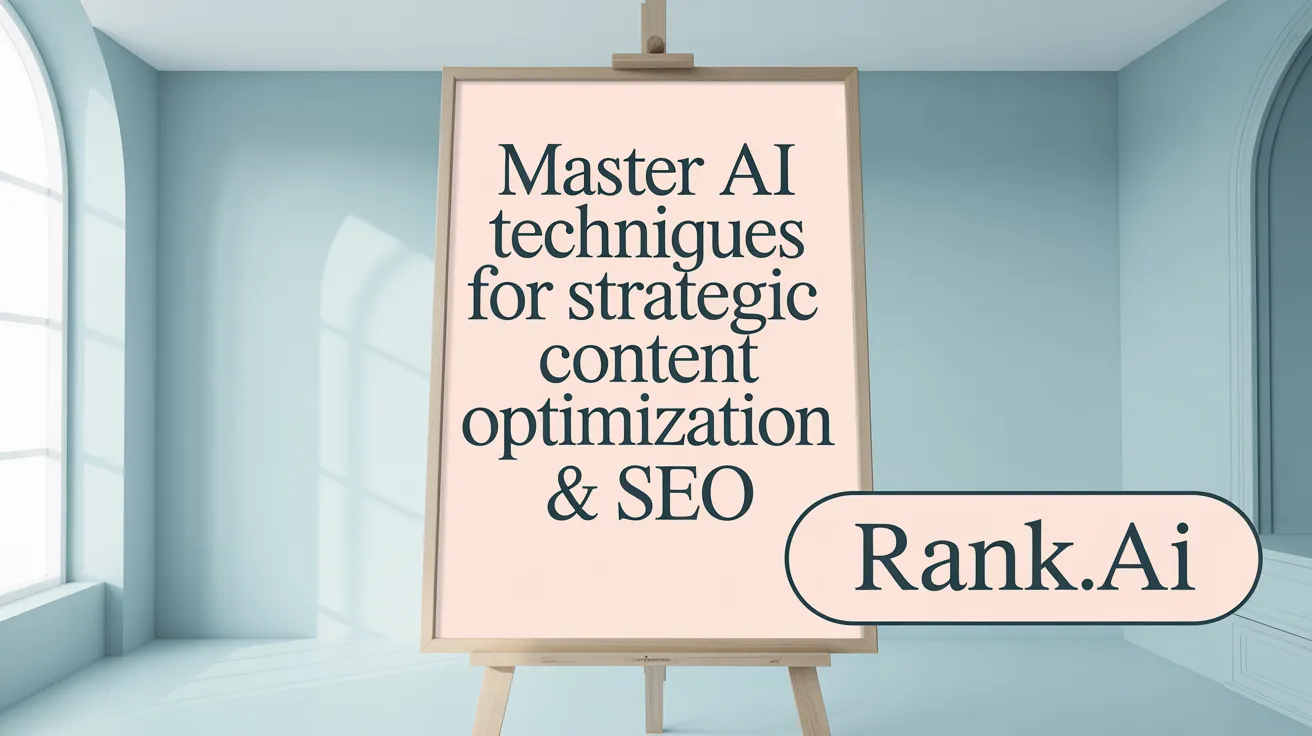Leveraging AI for Effective Content Creation and Optimization
Harnessing the Power of Artificial Intelligence for Next-Gen Content Strategies

The Dawn of AI in Content Creation and Optimization
Artificial Intelligence (AI) is revolutionizing the landscape of content marketing by combining scalability, personalization, and efficiency. From automating routine tasks to powering creative processes, AI-driven tools and methodologies are reshaping how content is planned, created, optimized, and analyzed. This article explores the current trends, tools, ethical considerations, and future directions for leveraging AI effectively to maximize content impact and business outcomes.
Integrating AI Into Your Content Creation and Optimization ...
Presenter: Brian Piper, Director of Content Strategy and Assessment at University of Rochester Discover how you can leverage AI to assist ...
Current Trends and Best Practices in AI-Driven Content Creation and Optimization

The landscape of AI-powered content creation and optimization is rapidly evolving, with organizations adopting innovative strategies to stay competitive. A prominent trend is the increasing use of generative AI tools such as ChatGPT, Jasper, and Copy.ai, which enable marketers to produce diverse, high-quality content efficiently. These tools assist in drafting articles, social media posts, scripts, and multimedia content like images and videos, significantly scaling content output without sacrificing quality.
Personalization and hyper-targeting have become central to effective content strategies. Leveraging real-time AI analysis of customer interactions, AI algorithms analyze browsing behavior, purchase patterns, and social media interactions to deliver highly tailored messages. This data-driven approach fosters stronger customer engagement and improves conversion rates by ensuring that content resonates with individual preferences.
Automation platforms like HubSpot, Adobe Sensei, and Mailchimp streamline routine marketing tasks, including email marketing, social media management, and campaign analytics. These tools facilitate faster workflow execution, allow for ongoing optimization, and help marketers focus on strategic activities by automating content scheduling, A/B testing, and audience segmentation.
Integration of multimedia content—such as videos, images, and interactive elements—is now vital, with AI supporting content adaptation for emerging formats like voice search, visual search, and augmented or virtual reality experiences. This enhances accessibility and engagement, especially as consumers increasingly favor multimodal interactions. For further insights, see Leveraging AI in video content creation.
Continuous improvement through data-driven insights is fundamental; marketers utilize AI analytics to monitor content performance, identify trending topics, and refine content based on feedback. This iterative process, grounded in predictive analytics and audience insights, ensures content remains relevant and effective in a dynamic digital environment.
Moreover, ethical considerations are emphasized in best practices, with organizations balancing automation with human oversight to maintain authenticity, prevent bias, and adhere to privacy standards. Responsible use of AI involves transparency about content origin and rigorous quality checks.
In summary, the current best practices revolve around harnessing generative AI for scalable content creation, leveraging personalized data for hyper-targeted strategies, automating workflows for efficiency, and integrating advanced multimedia formats—all driven by continuous, data-informed refinement to optimize content impact in 2024 and beyond.
AI Content Creation Tools: Features and Practical Applications
What features and applications do AI content creation tools offer?
AI content creation tools encompass a broad range of functionalities designed to streamline and enhance content production. Leading platforms such as Clearscope, ChatGPT, Jasper, and Copy.ai provide features that support both the creative and technical sides of content marketing.
Clearscope specializes in AI-powered content optimization for SEO. It analyzes top-ranked pages on search engines and offers suggestions on keywords, content structure, and readability, helping users create content that is both relevant and highly visible on Google. It also facilitates competitor analysis by highlighting what competing content covers and identifying gaps to fill.
Platforms like ChatGPT, Jasper, and Copy.ai act as intelligent drafting assistants. They generate ideas, outlines, and even full articles based on prompts provided by users. These tools help overcome writer's block, accelerate content creation, and produce a variety of content types such as blog posts, social media updates, email copy, and product descriptions. This is part of the broader trend where generative AI like ChatGPT revolutionizes how marketers approach content creation.
Multi-language support is another important feature. Tools like Copy.ai and Jasper offer support in numerous languages, empowering marketers to create localized content for global audiences.
While these tools significantly boost efficiency, human oversight remains crucial. AI-generated content may require editing for accuracy, tone, and alignment with brand voice. Properly managed, these tools can produce high-quality content efficiently while maintaining authenticity, as discussed in best practices for AI content generation.
Use cases across blogging, social media, email campaigns, and e-commerce
AI content tools are versatile and found across many marketing channels. Bloggers and website owners use them to generate engaging articles, optimize keywords for SEO, and analyze competitor content.
Social media marketers leverage these tools to craft posts quickly, ensuring consistent messaging and timely publication. Email marketers benefit from AI-generated email drafts and subject lines designed to improve open rates.
For e-commerce, AI tools help create product descriptions that are compelling, accurate, and optimized for search engines. They can also assist in generating promotional content for sales campaigns.
Overall, AI content creation tools empower marketers to produce better content faster, focus on strategic creative tasks, and adapt to the growing demand for personalized, high-quality digital content, as highlighted in AI in content marketing.
PlatformMain FeaturesApplicationsNotable SupportClearscopeSEO optimization, competitor analysisWebsite content, blog SEOIntegrates with WordPress, Google DocsChatGPTIdea generation, drafting, conversationBlog posts, social media, emailsMultiple languagesJasperContent generation, creative writingArticles, ads, product descriptionsTemplates for various formatsCopy.aiMultilingual support, content suggestionsSocial media, blogs, landing pagesSEO tools integration
Embracing these AI tools can transform content marketing by reducing production times and increasing output quality, making strategic oversight and human creativity essential in guiding AI-generated content, following ethical considerations and responsible AI use.
Enhancing Content Quality, Personalization, and User Engagement with AI
AI has become a powerful tool in transforming content marketing strategies by enabling highly personalized and engaging experiences for users. One of the main advantages of AI is its ability to analyze large volumes of user data and behavior patterns. By examining browsing history, purchase activities, social media interactions, and demographic information, AI algorithms can generate real-time insights that allow marketers to tailor content specifically to individual preferences.
Generative AI technologies, such as ChatGPT and other large language models, play a crucial role in producing targeted and customized content. These tools can craft personalized blog posts, technical documentation, email campaigns, and product descriptions that resonate deeply with each user. By adjusting tone, style, and messaging based on user data, AI helps create content that feels relevant and engaging, increasing the likelihood of conversions and fostering brand loyalty.
Beyond content creation, AI also optimizes messaging across multiple channels through advanced machine learning and natural language processing (NLP). This enables marketers to deliver consistent and contextually appropriate messages on platforms such as email, social media, websites, and digital advertisements. Automated recommendations and adaptive content ensure that users receive the most relevant information at the right time, significantly enhancing user engagement.
Balancing automation with human oversight remains essential to maintain trust and relevance. While AI can efficiently generate and personalize content, human marketers must oversee the process to ensure authenticity, ethical considerations, and brand integrity. Proper privacy measures and data handling practices are critical to avoid privacy concerns and to comply with regulations. See Ethical considerations in AI marketing and Transparency in AI-generated content.
Overall, AI's ability to analyze data, generate targeted content, and optimize messaging streamlines operations, improves customer insights, and enhances user engagement—all while maintaining a responsible approach to data privacy and ethical use.
AI-Powered Content Planning, Research, and Workflow Automation
Artificial intelligence is revolutionizing how marketers and content creators handle planning, research, and workflow processes by introducing unprecedented levels of efficiency and automation. AI assists in streamlining content briefs, outlines, and content refresh tasks, making it easier to produce high-quality, targeted material without significant manual effort. For insights on AI content creation and AI-driven content ideation, explore these resources.
One of the primary advantages of AI in this space is its ability to automate audience and competitor research. AI analytics tools analyze vast amounts of consumer data, social media activity, and industry trends to generate detailed psychographic profiles and identify emerging content opportunities. This data-driven insight allows marketers to tailor their strategies effectively, ensuring content resonates with target audiences and outperforms competitors. Learn more about AI analyzing consumer data and AI audience insights.
Moreover, AI enables autonomous workflows that can handle scheduling, publishing, and even content translation. For example, AI-powered platforms can automatically plan and update editorial calendars, translating content into multiple languages seamlessly, which is crucial for global outreach. See how AI marketing automation platforms and Free AI content creation tools support these capabilities.
Implementing AI effectively requires a structured approach. Marketers and content teams should assess existing workflows to identify repetitive or time-consuming tasks that can benefit from automation. Clear role definitions are essential, ensuring humans focus on creative, strategic, and oversight functions while AI manages routine operations. Guidance on building AI expertise in marketing and collaborating with data teams on AI can aid this transition.
Best practices include iterative testing of AI tools to refine outputs, scaling successful integrations progressively, and maintaining open channels for human feedback. This approach fosters a strong human-AI partnership—each complementing the other's strengths. For recommendations on experimenting in AI adoption and responsible AI use, reference these expert resources.
The evolution toward autonomous AI agents promises even more sophisticated content management, where AI can independently execute complex tasks, suggest improvements, and adapt to changing market dynamics. This shift empowers content teams to focus on innovation and high-level strategy, ultimately driving better content outcomes with less resource expenditure. Discover trends in generative AI in content creation and AI-powered content workflows.
In summary, AI's capabilities in streamlining planning, research, and automation not only boost productivity but also enhance the precision and relevance of content strategies. Organizations adopting these technologies are positioning themselves at the forefront of efficient and effective content marketing, crafting engaging experiences driven by intelligent automation. For a comprehensive overview of AI in content marketing and AI in content optimization, consider these detailed guides.
Strategic Content Optimization, SEO, and AI Techniques

What strategies are effective for content optimization, SEO, and ranking using AI tools and techniques?
Effective content optimization and SEO in the context of AI leverage advanced natural language processing (NLP), semantic analysis, and structured data to improve relevance and better understand user intent. Utilizing AI-powered keyword research tools like Semrush and Ahrefs allows marketers to identify high-value keywords, long-tail phrases, and content gaps efficiently. These insights help in crafting targeted content that aligns with what users are searching for, boosting visibility in both traditional search engines and AI Overviews.
AI engines can automate technical SEO tasks such as site audits, metadata optimization, internal linking, and sitemap updates. Tools like Surfer SEO and ChatGPT enable the generation of optimized headlines, meta descriptions, and content outlines, ensuring consistency and relevance. Moreover, organizing content into topical silos using AI helps establish authority and improves site structure for better indexing.
Optimizing for AI and voice search involves implementing schema markup, optimizing multimedia content, and ensuring accessibility. Incorporating rich media such as images, videos, and infographics enhances user engagement and meets the requirements for multimodal search environments. Implementing schema.org markup helps search engines and AI models to interpret your content accurately, improving chances of featured snippets and voice search answers.
Ultimately, combining these strategies with continuous performance monitoring and content refinement using AI insights ensures that your content remains competitive. Regularly auditing your site for technical issues, updating outdated content, and leveraging AI to track changes in search trends provide a proactive approach. This layered strategy not only boosts your ranking but also aligns with evolving AI guidelines and user preferences, helping your site stand out in a crowded digital landscape.
Additional insights
Research indicates that AI SEO content strategies for 2024 focus heavily on semantic relevance, user experience, and structured data usage. Incorporating AI tools effectively can reduce manual workload while increasing accuracy and consistency across all content facets—making your site both search-friendly and user-centric.
Utilizing AI for Data-Driven Content Performance Analysis and Decision Making

AI plays a crucial role in optimizing content marketing through comprehensive data analysis and real-time insights. By processing both structured data, such as website metrics and sales figures, and unstructured data like social media posts, reviews, and multimedia content, AI provides marketers with a holistic view of content performance. This extensive data handling capability allows for immediate assessment of how content is resonating with audiences, guiding timely adjustments to strategies.
One of AI's significant advantages is its use of predictive analytics. These models analyze past data to forecast future trends, audience preferences, and engagement patterns. For example, AI can identify emerging topics of interest or declining content areas, enabling marketers to pivot quickly and stay ahead of their competitors. Additionally, AI tools can analyze complex datasets to reveal hidden patterns or anomalies that human analysis might overlook.
Automation is another vital aspect of AI-driven performance monitoring. Routine tasks such as tracking KPIs, generating reports, and updating dashboards are handled automatically, allowing content teams to save time and reduce human error. This continuous monitoring ensures that marketers are always aware of their content’s effectiveness and can make data-informed decisions promptly.
Furthermore, AI enhances strategic agility by transforming raw data into actionable insights. It helps identify which channels and formats perform best, allocates resources efficiently, and personalizes content recommendations to target specific audience segments. With AI, marketers gain the ability to adapt strategies dynamically based on real-time feedback, thereby increasing content relevance and engagement.
In summary, AI empowers content creators and marketers by enabling rapid analysis of vast amounts of data, forecasting trends, automating routine checks, and providing strategic insights. This data-driven approach creates a foundation for more precise, responsive, and successful content marketing efforts.
For further information, search queries like "AI content analytics and performance monitoring" can provide additional insights into tools and techniques that capitalize on AI’s capabilities.
Navigating Ethical Considerations and Challenges in AI Content Generation
What are the ethical considerations and challenges involved in AI content generation?
AI content creation presents a complex landscape of ethical issues that need careful attention. One of the primary concerns is bias and fairness. AI models are trained on large datasets that may contain societal prejudices, which can lead to discriminatory or biased outputs. This risk necessitates ongoing monitoring, diverse data sourcing, and model adjustments to promote fairness and reduce unintended harm.
Privacy concerns are also prominent. The use of personal data, including biometric information, raises questions about consent, data security, and the potential for misuse. Ensuring compliance with data privacy regulations like GDPR is essential to protect user rights and maintain trust (responsible AI use).
Transparency is critical in AI-generated content. Disclosing AI involvement helps uphold accountability and builds audience trust. Clear labeling of AI-produced material prevents misinformation and keeps the audience informed about the content's origin (transparency in AI-generated content).
Legal issues form another vital aspect. Challenges include defining ownership rights for AI-generated works, liability for misinformation or harmful content, and navigating copyright laws. As regulations are still evolving, establishing legal frameworks to manage these issues is vital (legal issues in AI content).
Societal impacts extend beyond legality and fairness. There are concerns about job displacement, as AI automates tasks traditionally performed by humans (AI ethical considerations). Additionally, environmental effects from the high energy consumption of large models are increasingly scrutinized (energy consumption of AI).
In summary, AI content generation must be guided by responsible governance, ethical principles, and continuous oversight. Addressing bias, protecting privacy, maintaining transparency, respecting legal boundaries, and considering societal consequences ensures that AI technology is used ethically and sustainably, supporting positive societal progress rather than harm (responsible AI usage).
AI’s Transformational Role in Content Marketing Outcomes and Automation
Artificial Intelligence (AI) is revolutionizing content marketing by driving more personalized and predictive customer experiences. By analyzing vast consumer data, including browsing history and purchase patterns, AI enables hyper-targeted campaigns that significantly increase engagement and conversion rates. Advanced predictive analytics help marketers forecast trends, optimize demand, and tailor content to individual preferences, resulting in more relevant customer journeys.
Automation is at the core of AI’s impact, streamlining tasks such as content creation, distribution, and SEO optimization. AI-powered tools like ChatGPT generate drafts, headlines, and multimedia content at scale, reducing manual effort while maintaining high quality. These tools also facilitate rapid content distribution across multiple channels through automated scheduling and personalization, enabling brands to reach audiences more effectively.
Furthermore, AI enhances multimedia marketing strategies by supporting the production of rich visual and video content. Emerging applications incorporate augmented reality (AR) and virtual reality (VR), offering immersive experiences that captivate audiences and deepen engagement. AI-driven visual effects and interactive AR/VR applications are becoming central to future marketing efforts (Leveraging AI in Video Content Creation).
In the realm of search, voice and visual search technologies are seamlessly integrating into the content ecosystem. AI enables the creation of conversational content optimized for voice assistants, while image recognition and visual search enhance product discoverability and customer interaction (AI SEO and machine learning).
However, as AI takes on an increasingly prominent role, ethical considerations such as data privacy, transparency, and algorithmic bias must remain priorities. Responsible AI use builds consumer trust and ensures sustainable growth (Ethical considerations in AI marketing).
Looking ahead, the future of AI in content marketing hinges on smarter personalization, multimodal multimedia content, and immersive experiences. This evolution promises to deliver more engaging, relevant, and innovative marketing strategies that connect brands with consumers in meaningful ways (Future of AI in Content Marketing).
AspectCurrent ImpactFuture OutlookAdditional NotesPersonalizationHyper-targeted campaignsDeep personalization with real-time predictive analyticsIncreased customer satisfaction and loyaltyAutomationContent creation, schedulingFully automated, intelligent content managementGreater efficiency and scalabilityMultimediaText, images, videosImmersive AR/VR experiencesEnhanced engagement and emotional connectionSearch TrendsVoice & visual searchIntegration with AI-driven voice assistants and image recognitionBroader reach and richer customer interactionsEthical UseData privacy, bias managementFocused on transparency, accountability, and fairnessCritical for maintaining trust and compliance
AI’s influence on content marketing outcomes and automation continues to expand, with innovations promising to revolutionize how brands engage audiences while emphasizing responsible practices to sustain consumer trust (AI in Content Marketing).
Generative AI: Revolutionizing Text, Image, and Video Content Creation
What are generative AI models and what can they do?
Generative AI models, such as GPT-4 for text and DALL-E or Midjourney for images, can produce a wide variety of media content. These models are trained on massive datasets, enabling them to generate human-like text, realistic images, and even videos. For example, GPT-4 can write articles, scripts, and customer support responses, while DALL-E and Midjourney craft high-quality visual art from simple prompts.
How are these models applied in marketing and content creation?
Marketers leverage generative AI for numerous tasks. Scripts for videos and ads are quickly produced, social media posts are tailored at scale, and product visualizations are created without detailed design skills. These tools enable rapid prototyping and customization, helping brands engage audiences more effectively.
The human-in-the-loop process in generative AI workflows
Despite their capabilities, AI models still require human oversight. Content creators input prompts and review generated outputs, editing for tone, accuracy, and brand consistency. Fine-tuning AI outputs ensures high-quality content that aligns with strategic goals. Human involvement helps mitigate risks like inaccuracies, bias, or inappropriate content (AI content generation and human oversight).
Opportunities and risks in multimedia content
Generative AI offers incredible opportunities for personalized, engaging marketing materials created quickly and cost-effectively (AI marketing tools and ethical use). However, risks include the potential misuse of deepfakes, content ownership disputes, and ethical concerns around authenticity. As these models evolve, careful regulation and responsible use are crucial to harness their power safely (Ethical concerns in generative AI).
Maximizing SEO Efficiency through AI-Driven Automation and Insights
Automated keyword research and clustering
AI-powered tools simplify keyword research by analyzing vast search data to identify high-potential keywords and semantic variations. Platforms like Semrush’s Keyword Magic Tool or ChatGPT generate comprehensive keyword lists, including long-tail options with less competition but higher conversion rates. These tools also cluster related keywords to create thematic content plans, ensuring each page targets relevant search intents and improves authority.
Content gap and competitor analysis
AI systems scan top-ranking pages and industry competitors to spot content gaps and opportunities. Using platforms like Surfer SEO or Frase, marketers can analyze what questions and topics competitors are addressing and identify missing areas. This process helps in creating content that fills market needs, boosts topical relevance, and enhances chances of ranking higher in AI-driven search results.
On-page SEO optimization including metadata, internal linking, and image alt text
AI technologies assist in optimizing on-page elements efficiently. They generate SEO-friendly titles, meta descriptions, and headers tailored to target keywords. AI tools suggest relevant internal links to distribute page authority and improve navigation. Additionally, they optimize image alt text for accessibility and SEO, aligning with search engine guidelines (AI SEO).
Monitoring and adapting SEO strategies using AI analytics
Continuous improvement is crucial in SEO. AI analytics platforms like BrightEdge or SE Ranking provide real-time insights into performance metrics such as rankings, traffic, and user engagement. These insights enable marketers to adapt strategies promptly, refine keyword targeting, and update content based on evolving trends. Employing AI in monitoring ensures that SEO efforts remain effective and aligned with search engine algorithm changes, maximizing visibility in AI-mediated search results.
Expanding Content Reach with AI-Enabled Multilingual and Localization Tools
How does AI assist in language translation and cultural adaptation?
AI-powered translation tools like Google Translate, DeepL, and LingoAI leverage advanced natural language processing (NLP) models to accurately translate content across multiple languages. These tools not only convert text but also adapt idioms, cultural nuances, and context-specific phrases, ensuring content resonates authentically with diverse audiences. By analyzing vast datasets of language usage, AI can fine-tune translations to be culturally appropriate, helping brands connect globally while respecting regional differences.
What are the SEO considerations for distributing content internationally?
When expanding into global markets, optimizing for local search engines is critical. AI tools like Semrush, BrightEdge, and Ahrefs help identify region-specific keywords, optimize meta tags, and ensure content relevance for local audiences. Incorporating local idioms, currencies, and regional terminology enhances discoverability. Additionally, AI can analyze local search behaviors and trends, allowing marketers to tailor content strategies that align with each market’s unique search landscape.
How does AI support personalization across different languages and regions?
AI platforms facilitate hyper-personalized experiences by analyzing linguistic preferences and regional behaviors. Using multilingual AI models, companies can serve tailored content, product recommendations, and marketing messages that consider language preferences, cultural norms, and regional interests. AI-driven segmentation tools dynamically adjust campaigns in real time, ensuring relevance and increasing engagement with diverse customer bases.
What tools help streamline multilingual content workflows?
Tools like Frase, Lokalise, and TransPerfect utilize AI to automate translation, content editing, and localization processes. They enable collaboration among global teams by providing AI-assisted content briefs, version control, and quality checks. These platforms reduce manual effort, accelerate time-to-market, and maintain consistency across languages. With AI’s help, businesses can efficiently manage large-scale multilingual content strategies, ensuring each piece aligns with brand standards while respecting regional uniqueness.
How do AI tools foster content globalization?
AI accelerates content globalization by automating translation workflows, optimizing for local SEO, and personalizing content delivery. By seamlessly integrating linguistic adaptation with cultural insights, AI helps brands reach wider audiences without diluting their message. This not only broadens market reach but also builds trust and loyalty in diverse communities, making AI indispensable for modern multilingual and regional marketing efforts.
AspectAI CapabilitiesExamplesBenefitsLanguage translationNLP models adapt text culturallyGoogle Translate, DeepLAccurate, context-aware translationsSEO localizationKeyword analysis for regionsSemrush, AhrefsIncreased search visibilityPersonalizationBehavior-based regional targetingDynamicContent, OptimizelyHigher engagement ratesContent workflow managementAI-assisted editing and collaborationLokalise, CrowdinFaster, consistent content deployment
Harnessing AI for multilingual and localization strategies allows marketers to extend their global footprint, connect authentically with regional audiences, and optimize content performance across borders.
Integrating AI in Content Workflows: Collaborative and Scalable Approaches

Blending human creativity with AI assistance
Effective content workflows today often involve a seamless integration of human expertise and AI tools. Marketers and content creators use AI to generate initial drafts, research ideas, and automate routine tasks like editing and formatting. This collaboration allows humans to focus on strategic storytelling, emotional engagement, and brand authenticity. AI acts as a creative catalyst, enhancing productivity without replacing the human touch (AI content creation and social media engagement, AI-powered writing tools).
Role of prompt engineering in enhancing AI output quality
A critical factor in AI content creation is prompt engineering. Crafting precise, descriptive prompts enables AI models like ChatGPT to deliver more accurate, relevant, and high-quality outputs. For example, specifying tone, audience, and format in prompts helps shape outputs that align with brand guidelines and user expectations. Skilled prompt engineering transforms AI from a basic generator into a sophisticated assistant capable of generating nuanced and contextually appropriate content (AI content generation, Generative AI in content creation).
Collaborative platforms with AI support for editing and brand voice consistency
Many organizations leverage collaborative platforms integrated with AI capabilities, such as Notion AI or Writer.com. These tools support team collaboration, ensuring consistent voice, style, and messaging across all content. AI-driven editing features automatically check for tone, grammar, readability, and adherence to brand standards. This ensures high-quality outputs and maintains a cohesive brand identity across multiple channels (AI editing and proofreading tools, AI-powered content creation).
Scalable content production pipelines leveraging AI automation
To meet the demands of modern marketing, scalable content pipelines are essential. AI automation streamlines content creation processes by handling tasks like keyword optimization, content briefs generation, and multimedia content production. Automated workflows integrate AI tools with content management systems, enabling high-volume output without sacrificing quality. This scalability ensures brands can produce personalized, engaging content at speed, aligning with real-time marketing needs (Automating content workflows, AI content optimization).
ApproachBenefitsImplementation TipsBlending human creativity with AICombines strategic insight with AI efficiencyUse AI for drafts, humans for fine-tuning (AI in marketing)Prompt engineeringImproves quality and relevance of AI outputsInvest in training prompts and guidelines (AI prompt engineering)Collaborative AI-supported platformsEnsures consistency and teamworkSelect tools with editing and review features (Notion AI, Writer.com)Automated scalable pipelinesMeets high-volume content needsIntegrate AI tools with existing CMS and workflows (Frase content briefs, AI content automation)
Employing these approaches enables organizations to create rich, consistent, and efficiently produced content, leveraging AI’s capabilities while preserving human originality (Mastering AI for Marketing, AI in content marketing).
Future Outlook: Advanced AI Capabilities and Responsible Adoption in Content Marketing

Trends towards customizable and multimodal AI systems
The future of AI in content marketing is leaning heavily towards systems that are highly customizable and multimodal. These advanced platforms will not only allow marketers to tailor AI behaviors and outputs to specific brand voices and campaign goals but also enable integration across various media formats such as text, images, videos, and audio. For example, an AI system might generate a cohesive marketing campaign that includes personalized video messages, social media posts, and blog articles all tailored to individual consumer preferences, creating a seamless brand experience. Learn more about Generative AI for original content and Generative AI overview.
Increasing factual accuracy and coherence of AI-generated content
One of the significant challenges today is ensuring that AI-produced content is factually accurate and coherent over longer texts. Emerging AI capabilities aim to incorporate real-time data verification and improved reasoning skills, reducing hallucinations and inaccuracies. These improvements will make AI-generated content more reliable and trustworthy, which is essential as organizations increasingly rely on automated content for customer-facing communications. For insights on ensuring transparency in AI use and fact-checking AI-generated content, see related resources.
Ethical governance frameworks and transparency initiatives
As AI's role expands, so does the necessity for robust ethical governance. Future developments will likely include clearer transparency standards, such as digital watermarks for AI-generated content and stricter policies for data usage and bias mitigation. Industry-wide frameworks focusing on fairness, accountability, and responsible AI deployment will guide organizations to use AI ethically, maintaining consumer trust and complying with regulations. Explore the importance of ethical considerations in AI marketing and responsible AI use for more details.
Continuous upskilling and organizational readiness for AI integration
To effectively leverage these advanced AI systems, organizations must invest in ongoing employee training and infrastructure upgrades. Building AI literacy across marketing teams, fostering collaboration between data scientists and content creators, and developing agile organizational structures will ensure readiness for rapid technological advancements. This proactive approach will enable marketers to stay ahead in a competitive landscape where AI-driven personalization and automation are becoming the norm. Consider resources on building AI expertise and developing AI skills for marketers.
By embracing these trends, content marketers can harness AI's full potential while committing to responsible use—creating innovative, accurate, and ethically sound content strategies that resonate with consumers in 2025 and beyond. For a comprehensive outlook on AI shaping the future of marketing and AI content creation tools, see additional resources.
Embracing AI for Smarter Content Creation and Optimization
Artificial Intelligence continues to shape the future of content creation and marketing by providing powerful tools that enhance efficiency, personalization, and strategic insight. Successfully leveraging AI requires balancing automation with human creativity and ethical responsibility to produce content that resonates authentically with audiences while driving performance. As AI technologies evolve, businesses that invest in education, governance, and adaptive workflows will gain a competitive edge through smarter, data-driven content strategies that meet the demands of an increasingly dynamic digital landscape.
Table of contents
Recent articles
Fresh insights on AI and SEO to help you stay ahead of the curve.


Ready to Improve
Your Rankings?
Use our free tools to get instant insights into your SEO performance and discover opportunities to rank higher




